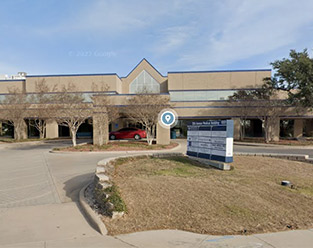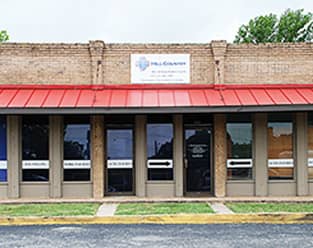Treatment for Traumatic Brain Injury in Texas

Advantage Healthcare Systems | Comprehensive Care after a TBI
Symptoms and Diagnosis | Causes, Treatment and Prevention
According to statistics compiled by the Centers for Disease Control (CDC), traumatic brain injury, or TBI, affects as many as four million Americans every year. Studies show that early diagnosis and treatment can significantly improve the chances of full or maximum recovery.
At Advantage Healthcare Systems, with offices in Dallas, Fort Worth, San Antonio, Southlake, Canton and Waxahachie, we offer comprehensive brain injury rehabilitation programs that cover the continuum of care. We understand that everyone’s medical situation is unique, so we customize our treatment plans to meet your individualized needs. We also treat patients from offices in Metairie, Louisiana.
What Is a Traumatic Brain Injury?
A traumatic brain injury (TBI) occurs when you sustain a blow to your head that disrupts the soft tissue and/or stability of the brain. Whether you suffer a skull fracture, swelling or inflammation, or a whiplash type of injury, any harm to your brain can generate severe and long-lasting injuries. Because your brain is the control center of your body, it’s critical to identify a traumatic brain injury before it becomes a life-altering condition, so that you can protect your long-term health and ensure an acceptable quality of life.
Traumatic Brain Injury (TBI): Causes, Treatment, and Prevention
What Causes a TBI?
Though atraumatic brain injury typically stems from a significant blow to the head, it can also be the result of a tumor, infection, stroke, brain swelling, hematoma, skull dent or fracture. When your head absorbs force, brain tissue can be damaged when your brain bounces off the inside of your skull. This often leads to internal bleeding, swelling, and/or clots that can place significant pressure on your brain. Furthermore, blunt force to your skull can either dent the skull, causing pressure on the brain, or penetrate brain tissue or fractureyour skull, leading to significant cognitive impairment.
The most common causes of a traumatic brain injury are automobile accidents, sports-related injuries, and falls.
The Warning Signs of a TBI
As with any type of trauma, different types of injury to your brain will cause different symptoms. It’s essential that you exercise maximum caution before you make any assumptions about any type of head injury, whether sustained in a major sports-related collision or in a motor vehicle accident. Because concussions, contusions, and other brain injuries can have delayed symptoms, you need to watch for any symptoms over a period of weeks or even months. If any of the following indications of a TBI appear, you should immediately schedule an appointment with your primary care physician, who can conduct a thorough examination and either prescribe treatment or refer you to a specialist.
The common symptoms of a traumatic brain injury include, but are not limited to:
- Difficulty speaking
- Sensitivity to light and sound
- Muscle stiffness and instability
- Emotional distress and instability
- Moods swings and changes
- Decrease in cognitive function
- Memory loss
- Nausea and/or vomiting
- Blurred vision
- Seizures
- Ringing in the ears
- Nerve damage
- Headaches or migraines
- Depression
- Lack of concentration
- Amnesia
- Inability to understand language
The Importance of Early Detection of a Traumatic Brain Injury
With a mild TBI, the best treatment may be rest, so that you avoid any further damage, and allow your body to heal naturally.As with any injury, early treatment and detection will typically increase your treatment options, help to limit complications, and promote a fast and complete recovery. Symptoms of a TBI can vary greatly, though, and may not appear for days, weeks, or even months after your accident. Left undetected, a traumatic brain injury can leave the brain in a weakened state, potentially exposed to further harm. When watching for the telltale signs or symptoms of a TBI, you must also be conscious of the significant impact a TBI can have on your personality, physical abilities, and cognitive capacity.
The Glasgow Coma Scale
Many of the traditional diagnostic tools are relatively ineffective when trying to identify a TBI. Imaging technology, such as x-rays or MRIs, typically won’t confirm a traumatic brain injury. Instead, when evaluating your overall condition and functional capacity after a TBI, your physician may conduct a Glasgow Coma Scale (GCS) assessment to determine the severity of your TBI. With the GCS, your doctor makes certain physical observations of your eye opening response, your verbal response, and your motor response, and allocates points. Your total score determines both the existence and the severity of any TBI.
Here is what your physician assesses, along with the points allocated for each response:
Eye Opening Response
- Spontaneous; open with blinking at baseline–4 points
- To verbal stimuli, command, speech–3 points
- To pain only (not applied to face)–2 points
- No response–1 point
Verbal Response
- Oriented–5 points
- Confused conversation, but able to answer questions–4 points
- Inappropriate words–3 points
- Incomprehensible speech–2 points
- No response–1 point
Motor Response
- Obeys commands for movement–6 points
- Purposeful movement to painful stimulus–5 points
- Withdraws in response to pain–4 points
- Flexion in response to pain (decorticate posturing)–3 points
- Extension response in response to pain (decerebrate posturing)–2 points
- No response–1 point
A score of 3 represents a vegetative state, whereas a score of 15 represents a mild brain injury. After conducting the GCS, your doctor will know the extent of your injuries and how best to proceed to improve your condition. You may be prescribed a regimen of care or referred to a neurologist or physiatrist for further treatment.
Effective Treatment of Traumatic Brain Injury in Texas
When it comes to a highly important and sensitive organ like the brain, treatments need to be carefully considered. Treatment for a TBI may be immediate and acute, or it may involve long-term and relatively passive care. Our team of physicians at Advantage Healthcare Systems will put together a treatment plan that responds to your specific condition and addresses your unique needs, so that we can maximize your immediate and long-term holistic health. Your prescribed treatment may include:
- Rest: With a mild TBI, the most common treatment is the limitation ofdaily activities, combined with rest. Rest allows your body to heal naturally and limits the risk of further injuryor setbacks.
- Surgery: A surgeon can conduct a procedure, known as a decompressive craniectomy, to reduce swelling and fluid buildup and create room for the brain to swell. By cutting out a piece of your skull, a surgeon can remove excess fluids, clots, or fractured pieces of skull that may potentially cause pressure on your brain. After a significant fracture, a surgeon may insert a metal plate for additional protection.
- Medication: Based on our analysis of your condition, we may prescribe medication to manage or improve your symptoms, including antianxiety agents, anticoagulants, anticonvulsants, antidepressants, muscle relaxants, stimulants, or antinausea agents.
Your Recovery from a Traumatic Brain Injury
Regardless of the severity of your TBI, the likelihood is significant that you will have a challenging road to recovery, one that demands patience and dedication to the rehabilitation of your cognitive, emotional, and physical health.
When you come to us for treatment of a TBI, we will first exhaust all medical options. When medical intervention has reached its limit, we will turn to various forms of therapy or rehabilitation to help you maximize your return to wellness. Depending on the severity of your TBI, you may use one or a combination of these rehabilitative therapy approaches:
Post-Acute Day Program (Outpatient)
The post-acute day program at Texas-based Advantage Healthcare Systems allows you to receive treatment for 4 to 8 hours per day, Monday through Friday. During daily therapy, you’ll receive personal attention focused on your individual goals and needs.
At Advantage Healthcare Systems, we understand that every patient’s condition is unique, so we tailor treatment to meet your unique needs and goals, offering a clear plan for reinforcing daily living skills and encouraging leisure activities. Each personalized plan is focused on areas such as physical functioning, communication, cognitive treatment, daily living activities, community integration, leisure activities, psychological adjustment and behavior management.
Types of Therapy and Individual Treatments
Physical Therapy
Physical therapy helps patients improve mobility, reduce pain, and restore function through therapeutic exercise and functional training, with the use of assistive and adaptive devices and equipment.
Physical therapy covers many skills, such as:
- Gait training
- Balance
- Strengthening and core-stabilizing activities
- Reintroduction to physical activities such as walking and running
Occupational Therapy
Occupational therapy helps you relearn and reestablish the basic activities of daily living, including but not limited to:
- Grooming and dressing
- Handling money, paying bills
- Hobbies and leisure activities
- Shopping
- Home upkeep
- Cooking
- Driving
Speech/Language Therapy
Our speech/language pathologists will help you regain the ability to:
- Understand simple and complex conversations
- Produce speech that can be understood by others
- Communicate meaningfully
- Function successfully in social communication situations
- Manage conversational norms
Therapeutic exercises target speech muscle strengthening, language-focused training and strategy development, and social conversation training.
Cognitive Rehabilitation
When our treatments are combined with functional, individualized therapy activities, your potential is enhanced to recover important brain skills and abilities, such as memory, attention, and problem solving.
Behavioral Therapy
Our psychologists and team members can help you deal with depression, replacing maladaptive and sometimes self-destructive behaviors with new, more appropriate actions that make it easier to create an environment of success.
Occupational Rehabilitation
Many of our patients want to return to work. We will conduct a thorough assessment to determine what you need to re-enter working world. By conducting in-depth professional evaluations to determine your abilities and interests, our specialists help you learn and practice everything from workplace behaviors to interview skills. We can also identify your unique abilities and the challenges in returning to your previous job, looking at new career or volunteer or educational options, if necessary.
Biofeedback
We use biofeedback for the treatment of many common pain problems, most notably headache and back pain. In the process, we will train you to become aware of, to follow, and to gain control over certain bodily functions, including muscle tension, heart rate, and skin temperature. You can then learn to effect a change in your responses to pain, such as using relaxation techniques. Biofeedback is often used in combination with other treatment methods; similarly, the use of relaxation techniques in the treatment of pain can increase your feeling of well-being.
Counseling
At Advantage Healthcare Systems, your treatment incorporates the mental, physical, and emotional components of your growth and development. When you attend counseling sessions, you’ll learn about your condition and receive an intense combination of therapy, education, and social conditioning. We’ll help you focus on a lifetime of recovery and creating a brighter and more productive future.
During counseling sessions, you may be asked to address a series of topics about yourself, including
- Your methods for dealing with stress
- Your coping mechanisms
- The extent to which you deal with depression, loneliness or anxiety
- Your sense of self-esteem
- Any identity issues, including cultural, religious, gay/lesbian/bisexual/transgender, etc., that may affect your recovery
- Your body image
- Any eating disorders you may have
- Any challenges you have forming or maintaining healthy relationships
- Any history of physical or emotional abuse (past or present)
- Cross-cultural issues (including cultural conflicts between parents and children)
- Difficulty defining problems
- Marked changes in functioning
- Irritability
- Changes in thinking or perceptual abilities
- Difficulty setting limits with others
Strategies for Preventing Traumatic Brain Injury
Brain injuries can have serious consequences and can lead to irreversible damage. There are no safety measures that are too insignificant to consider when it comes to protecting your head. Rather than relying on the immediate recognition of often-subtle TBI symptoms and treatment of severe brain damage, consider the steps you can take in your daily life to prevent brain injuries.
- Play smart – Whether you are a professional athlete or a rec-league phenom, competing in sports can lead to high-speed collisions or awkward falls. By wearing the proper gear and playing alert, you can protect yourself from unnecessary TBIs.
- Drive safely – From wearing your seatbelt at all times to adhering to road safety best practices, you can limit your risk of experiencing a significant car crash. You also have to be alert for the behavior of other drivers; many TBIs occur as a result of the other driver’s poor decisions.
- Stay alert and pay attention – Much of our lives is automated. When we get into our daily routines, life can feel dull and routine. However, this doesn’t mean that surprises can’t arise at a moment’s notice. Whether you work in a warehouse or you walk your dogs daily, being alert at all times allows you to react to your surroundings and avoid unexpected accidents.
Our Traumatic Brain Injury (TBI) Team
Our traumatic brain injury (TBI) team members include:
- Clinical neuropsychologists
- Board-certified physical medicine and rehabilitation physicians
- Board-certified neurologists
- Psychologists
- Physical therapists
- Occupational therapists
- Speech therapists
- Licensed professional counselors
- Licensed master’s-level social workers
- Nurses
- Rehabilitation technicians
- Case managers
Contact Advantage Healthcare Systems for TBI Treatment in Fort Worth
Don’t allow an untreated brain injury to affect your cognitive, emotional, and physical state while leaving you susceptible to further harm. Call our office at (866) 586-1755 to begin your recovery from a TBI.





